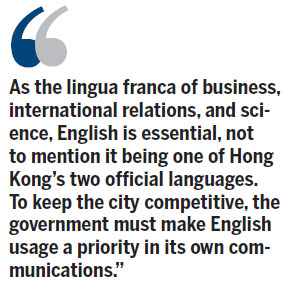English slipping in our city
Updated: 2013-10-19 08:20
By Caitlin Dwyer(HK Edition)
|
|||||||||

Hong Kong is a polyglot's paradise. On the street, snippets of Cantonese, Tagalog, Arabic, Malay, Mandarin and French drift across the crowds. Hong Kong has long been a global marketplace, and linguistically it remains diverse. Sadly, however, one language is slipping out of favor: English.
Private and public sectors must work together to fight this atrophy and promote English in Hong Kong. As the lingua franca of business, international relations, and science, English is essential, not to mention it being one of Hong Kong's two official languages. To keep the city competitive, the government must make English usage a priority in its own communications. It should promote English as part of school curricula. In addition, businesses should ensure that their employees have opportunities for continuing language education.
The average Hong Kong citizen doesn't dazzle with English-speaking prowess. A 2012 study by education company English First found that Hong Kong trailed Singapore, South Korea, Japan, Malaysia, and Pakistan in English proficiency - coming in barely above "Low" proficiency on the global index. Like Singapore, Hong Kong has its own style of English, with quirks unique to the city. But unlike its English-savvy competitor, the Hong Kong government has pushed Mandarin over English in recent years - and more residents can now speak Putonghua than English, according to the recent census. This helps business with the mainland, but hurts Hong Kong internationally.
Hong Kong workers need English in their jobs. In the recent census, 30 percent of employed persons reported that they used English "often or sometimes" for business activities, including meeting with clients and communicating with colleagues. Over 40 percent use English for sending e-mails to clients, drafting reports, and doing research at work. A 2010 study by the Hong Kong Polytechnic University found that English remains the go-to language for professional communication at work. As professionals advance up the pay scale, their use of English increases.
However, only 26.4 percent of economically active persons rated their English as "very good" or "good" in the census, while more than 38 percent were "poor" or "no knowledge" (In contrast, Singapore's 2010 census reported 80 percent literacy in English). Although their jobs demand English, many workers do not have the ability to use it effectively. This makes Hong Kong companies more likely to lose business to other Asian powerhouses.
English also remains the language of science. Hong Kong's universities are emerging as some of the top research centers in Asia. But to participate in the global scientific community, scientists must publish in peer-reviewed journals - the vast majority in English. As once scientists wrote their results in Latin, they now discuss dark matter and skin grafts in the language of Shakespeare. If Hong Kong wants to lead in epidemiology and engineering, it must engage with the world in English.
English evokes a history of inequality and colonialism, but over time, it has become part of the rich linguistic fabric of this city. Rejecting imperialism can no longer mean simply rejecting English. In Hong Kong, English place-names - Ice House Street, Nathan Road - pair with their Cantonese counterparts to create a rich linguistic map. As residents wander through their city, they do so in multiple languages. Globally, few places have such an asset. Strengthening English in workplaces and education centers won't threaten mother-tongue education. It's simply another layer in a society that operates on multiple levels.
English-decline anxieties are nothing new. A 1989 New York Times article proclaimed "English is in trouble" in Hong Kong. The 1997 handover spurred a wave of worries as the government introduced mother-tongue education. Articles periodically lament the splintering of standard grammar and pronunciation. But the recent trend has less to do with a stuffy insistence on proper grammar, and more with keeping the city vibrant, diverse, and internationally competitive.
What can Hong Kong do to encourage English use? Companies could offer continuing education for employees, either in-house or by setting aside time for external study. In the census, 83 percent of Hong Kong workers said they would like to improve their written English for work purposes, and nearly 72 percent said they would pursue training in their spare time. A workforce hungry for training is an untapped economic resource.
But private business can't train a workforce alone. Responsibility rests with the Hong Kong government to set an example, by using English as one medium of communication, internally and with the public.
In 1997, the government declared its intent to make Hong Kong bi-literate and trilingual. However, if trilingual really means bilingual, with lip service to one or more languages, Hong Kong will lose out. Other Asian cities, whose priority has been to develop a linguistically diverse workforce, will snag the research grants, the contracts, and the international talent.
Hong Kong remains, stubbornly, its own beast. The city teems with contradictory ideas, including its languages. Rather than fighting the contradictions, Hong Kong should find strength in the tension. By embracing the practical use of English and Mandarin, while maintaining its strong Cantonese culture, Hong Kong can build on the qualities that make it unique.
The author is a freelance writer and journalist. She spent two years writing and teaching on the Chinese mainland and received her Master of Journalism degree from the University of Hong Kong in 2013.
(HK Edition 10/19/2013 page6)